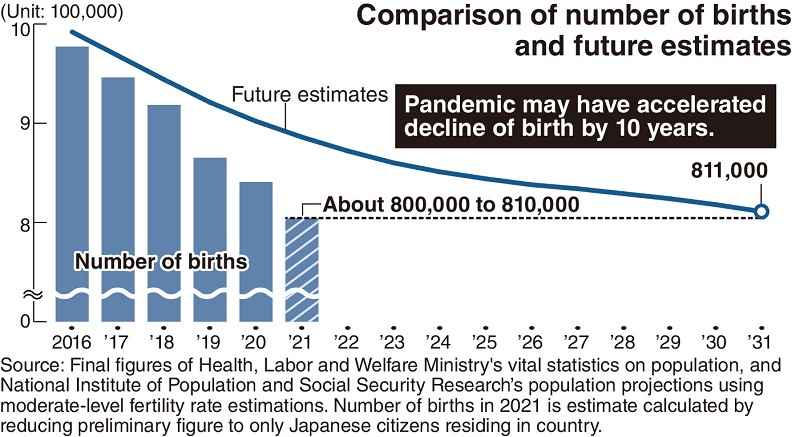
A mother and a child stroll in a park in Osaka Prefecture.
7:00 JST, March 30, 2022
The decline in the nation’s birthrate is accelerating as more people, unsure of the future amid a seemingly never-ending pandemic, are putting off having children.
There has also been a sharp decrease in the number of marriages, which strongly affects the birthrate, raising concerns the pandemic will have a long-lasting effect.
As the birthrate falls faster than expected, it creates a situation in which the foundation of the social security system — in which members of working generations mainly provide the support for senior citizens — is being shaken to the core.
10 years sooner
“We have no choice but to give up on having a third child,” said a 34-year-old female part-time office worker from Osaka Prefecture. “It’s really frustrating.”
She and her husband had talked about having a third child. Their two children were attending day care so she could work, but during the pandemic, she was requested to keep them at home.
That left her with no choice but to take a leave of absence from her job. Her parents live a 10-minute drive away, but leaving the children with them was not an option.
“I was worried that my children may infect my parents or be infected by them, so I couldn’t ask them to help,” she said.
The sense of isolation she felt from child-rearing in the face of the pandemic was all but unbearable.

According to preliminary statistics released by the Health, Labor and Welfare Ministry on Feb. 25, the number of children born in 2021 was a record-low 842,897, a decrease of nearly 30,000 from the previous year.
Uncertainty over the future amid the pandemic, leading to a reluctance to have more children, is seen as exacerbating the existing trend of a birthrate long on the decline.
The ministry said that the preliminary figure includes children born to foreign nationals living in Japan, so the final count, which will be narrowed down to Japanese citizens residing in the country, will likely be between about 800,000 and 810,000.
The National Institute of Population and Social Security Research estimated in 2017 that the number of births in 2021 would be 886,000, based on a calculation of population projections using moderate-level fertility rate estimations, which have the highest possibility.
That means that if the number of children actually born in 2021 is somewhere between 800,000 and 810,000, it will be nearly 80,000 less than the 2017 estimate.
As it is also close to 811,000, which is the expected number of births in 2031, it can be said that the pandemic has helped accelerate the pace of decline in the birthrate by 10 years.
110,000 ‘lost’ marriages
Even if the pandemic ended today, it will have an effect on the number of births for a long time.
In Japan, the number of marriages, which has a strong correlation to childbirths, were down 4.3% from the previous year to 514,242 in 2021. That marked the lowest level since the end of World War II.
The pandemic is believed to be the cause of many couples either postponing marriage or giving up on it altogether. It was also significant that there were fewer opportunities to meet others as people refrained from going out or eating out.
A 31-year-old female company employee from Tokyo said she was considering getting married in 2021, but said she and her fiance, who runs a restaurant, abandoned the plan. “I can’t make plans for the future as long as things remain so uncertain,” she said.
Asako Chiba, a postdoctoral fellow at the Tokyo Foundation for Policy Research, and her colleagues estimated that based on a comparison with data on the number of marriages over the 10 years up to 2019, about 110,000 marriages were “lost” in the two years of 2020 and 2021.
The estimates suggest that 150,000 to 200,000 fewer children will be born in the future. Postponing a marriage delays the birth of a first child, which can lead to fewer people having a second child.
“Since a decrease in the number of marriages has medium- to long-term effects by reducing the number of future births, policies should be implemented with the post-pandemic future in mind,” Chiba said.
Top Articles in Society
-

Producer Behind Pop Group XG Arrested for Cocaine Possession
-

Man Infected with Measles Reportedly Dined at Restaurant in Tokyo Station
-

Man Infected with Measles May Have Come in Contact with Many People in Tokyo, Went to Store, Restaurant Around When Symptoms Emerged
-

Woman with Measles Visited Hospital in Tokyo Multiple Times Before Being Diagnosed with Disease
-

Bus Carrying 40 Passengers Catches Fire on Chuo Expressway; All Evacuate Safely
JN ACCESS RANKING
-

Producer Behind Pop Group XG Arrested for Cocaine Possession
-

Japan PM Takaichi’s Cabinet Resigns en Masse
-

Man Infected with Measles Reportedly Dined at Restaurant in Tokyo Station
-

Israeli Ambassador to Japan Speaks about Japan’s Role in the Reconstruction of Gaza
-

Videos Plagiarized, Reposted with False Subtitles Claiming ‘Ryukyu Belongs to China’; Anti-China False Information Also Posted in Japan





















